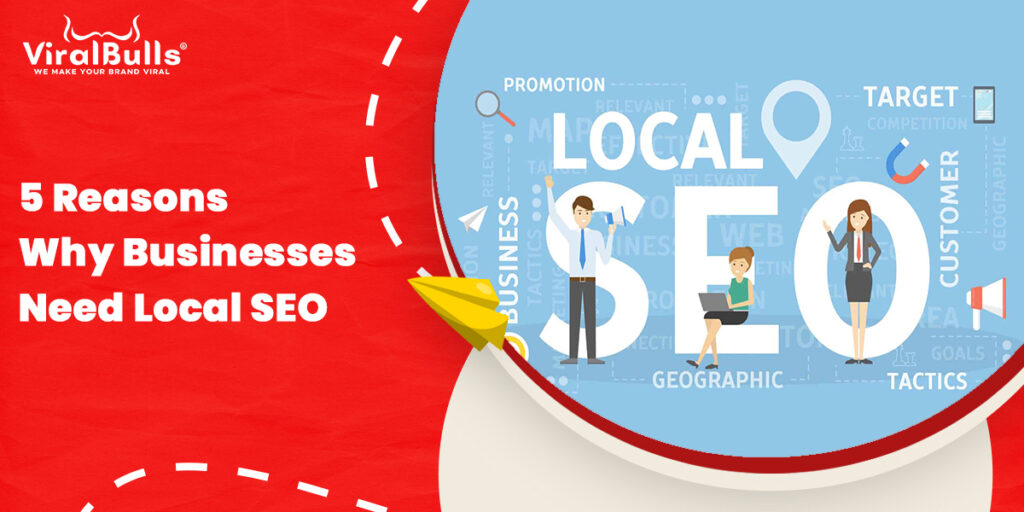Introduction
As a business owner, you know how important it is to reach potential customers online. You’ve probably heard of SEO or search engine optimisation, which is the process of optimizing your website and content to rank higher in search engine results pages (SERPs). But have you heard of local SEO? If you have a physical storefront or service area, local SEO can be a game-changer for your business. In this article, we’ll dive into what local SEO is, how it works, and five reasons why your business needs it.

What is Local SEO?
The practice of improving your internet visibility for relevant local queries is known as local SEO.For example, suppose you own a pizza restaurant in San Francisco. In that case, local SEO can help your business appear in Google Maps listings and local search results when someone searches for “pizza near me” or “best pizza in San Francisco.”
Local SEO involves optimizing your website, creating and optimizing Google My Business listings, building local citations, and getting reviews from happy customers. All of these efforts work together to help your business appear more prominently in local search results.
How Does Local SEO Work?
Local SEO works by optimizing your online presence to show up more prominently in local search results. There are a few key factors that influence local SEO:
- Google My Business Listing: Your Google My Business (GMB) listing is one of the most important factors in local SEO. It’s essentially a free directory listing for your business that appears in Google Maps and local search results. Optimizing your GMB listing with accurate information, photos, and reviews can help your business appear more prominently in local search results.
- Local Citations: Local citations are mentions of your business on other websites, such as directories or review sites. These citations typically include your business name, address, and phone number (NAP). Building local citations can help your business appear more prominent in local search results and can also help with backlinks to your website.
- On-Page Optimization: On-page optimization involves optimizing your website content and structure for local search. This includes optimizing your website for local keywords, creating location-specific pages, and including your NAP on your website.
- Reviews: Online reviews are becoming increasingly important in local SEO. Encouraging your customers to leave positive reviews on your Google My Business listing and other review sites can help your business appear more prominently in local search results.
Why Does My Business Need Local SEO?
Now that we’ve covered what local SEO is and how it works, let’s dive into five reasons why your business needs it.
- Local SEO Draws in New Business– One of the biggest benefits of local SEO is that it can help your business attract new customers who are actively searching for your products or services. When someone searches for a local business or service, they are usually looking to make a purchase or use that service soon. By appearing prominently in local search results, you can capture their attention and potentially win their business.
- Many People Like Buying Local– In recent years, there has been a growing trend toward supporting local businesses. Many consumers prefer to shop locally and support their community. By optimizing your online presence for local search, you can tap into this trend and attract customers who are specifically looking for local businesses.
- Local SEO Helps with Mobile Searches– More and more people are using their mobile devices to search for local businesses. In fact, according to Google, 46% of all searches have local intent. By optimizing your website and online presence for local search, you can ensure that your business appears prominently in mobile search results.
- Local SEO Puts You in the Game– If you’re not investing in local SEO, you’re missing out on a huge opportunity to compete with other local businesses. By optimizing your online presence for local search, you can level the playing field and compete with larger businesses with bigger marketing budgets. Local SEO can help you appear prominently in local search results and attract new customers, even if you don’t have a huge advertising budget.
- Local SEO is Cost-Effective– Compared to traditional advertising methods like print ads or billboards, local SEO is relatively inexpensive. While there may be some costs associated with building local citations or optimizing your website, the benefits of local SEO can be huge. By investing in local SEO, you can attract new customers and increase your revenue without breaking the bank.
Maximize Your Business Revenue Through SEO
If you’re ready to start reaping the benefits of local SEO, there are a few steps you can take to get started:
- Identify your target audience: Knowing who your target audience is will help you optimize your website for the right keywords and create content that resonates with them.
- Conduct keyword research: Conducting keyword research is crucial for optimizing your website for the right keywords that your target audience is searching for. To locate high-volume, low-competition keywords, use programs like Google Keyword Planner, Ahrefs, or SEMrush.
- Optimize your website: Optimize your website by using keywords in your meta tags, header tags, and throughout your content. Ensure that your website has a fast loading speed, is mobile-friendly, and has a good user experience.
- Create high-quality content: Creating high-quality, informative, and engaging content is essential for ranking well in search engines and attracting potential customers. Regularly publish blog posts, articles, infographics, and videos that provide value to your target audience.
- Build quality backlinks: Building quality backlinks to your website from reputable websites is an effective way to improve your website’s authority and increase its visibility in search results. Make contact with other websites and request a backlink to yours.
- Use social media: Social media platforms are a great way to increase your online visibility and drive traffic to your website. Share your content on social media and engage with your audience to build relationships and brand awareness.
- Monitor and analyze your results: Monitor and analyze your website’s traffic and rankings to determine where you can improve, then change your SEO strategy accordingly.
- Optimize for local search: If your business targets local customers, it’s crucial to optimize for local search. Use local keywords, create a Google My Business profile, and ensure that your website includes your business’s name, address, and phone number (NAP).
- Focus on user intent: Google prioritizes websites that best satisfy the user’s intent behind their search query. Make sure your content is tailored to your target audience’s needs and answers their questions or solves their problems.
- Improve your website’s authority: Domain authority (DA) is an important factor that influences how well your website ranks in search engine results. You can improve your website’s authority by creating high-quality content, building backlinks, and engaging with your audience.
- Utilize structured data: Search engines can better grasp the material on your website when you use structured data. By adding structured data to your website, you can increase your chances of appearing in rich snippets, which can improve your click-through rate (CTR) and drive more traffic to your website.
- Optimize for mobile: With the rise of mobile devices, it’s crucial to optimize your website for mobile users. Ensure that your website is responsive, has a fast loading speed, and provides a good user experience on mobile devices.
- Use analytics tools: Using analytics tools like Google Analytics and Google Search Console can provide valuable insights into your website’s performance. You can use these tools to monitor your website’s traffic, track your rankings, and identify areas for improvement.
- Stay up to date with SEO trends: SEO is constantly evolving, and staying up to date with the latest trends and best practices is essential for success. Subscribe to SEO blogs and forums, attend conferences, and network with other SEO professionals to stay on top of the latest developments in the industry.
Conclusion
For your company, local SEO can be a game-changer. By optimizing your online presence for local search, you can attract new customers, compete with larger businesses, and increase your revenue with viral bulls . Whether you’re a small local business or a larger company with multiple locations, investing in local SEO is a smart move that can pay off in a big way.





